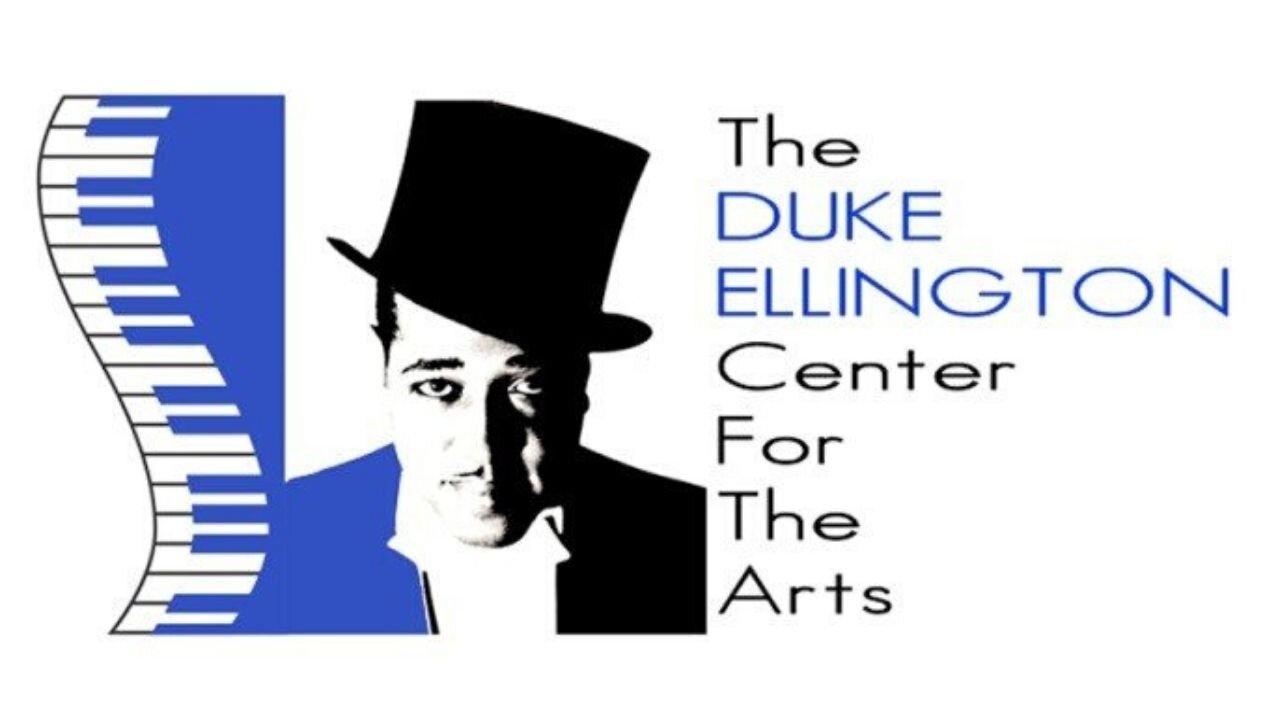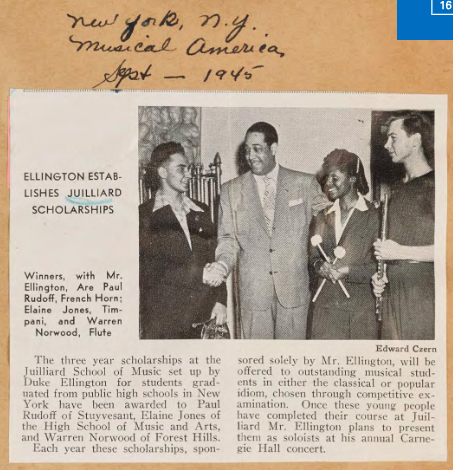
Duke Ellington
Duke Ellington called his music “American Music” rather than jazz, and liked to describe those who impressed him as “beyond category.” He remains one of the most influential figures in jazz, if not all American music, and is widely considered one of the twentieth century’s most prolific composers and best-known African American personalities. He is often credited for giving American music its own sound for the first time, and influenced millions of people both at home and around the world.
As both a composer and bandleader, Ellington's reputation increased since his death, with the continuous thematic repackaging of his signature music, often becoming best sellers. Posthumous recognition of his work includes a special award citation from the Pulitzer Prize Board. Duke Ellington Milestones include:
President Lyndon Johnson presented Duke Ellington with the President’s Gold Medal in 1966.
President Richard M. Nixon presented Duke Ellington with the Medal of
Freedom in 1969.Duke Ellington received 13 Grammy Awards.
Duke Ellington received the Pulitzer Prize
He was awarded the French Legion of Honor in 1973.
The United States Post Office issued a Commemorative Stamp with his image on it in 1986.
The exhibition held in 2009 examined two jazz standards, each one its author’s most-recorded piece: Caravan, written in 1936 by Duke Ellington and Juan Tizol, and Take the "A" Train, composed in 1941 by Billy Strayhorn. Caravan debuted with a combo that included Ellington and was led by his clarinetist Barney Bigard, and "A" Train was premiered by the Duke Ellington Orchestra. In addition to many recordings made by Ellington, Caravan has been recorded by other musicians more than 1,100 times and "A" Train more than 900 times. Click here to see online version of the exhibition and click here for the recordings.
Duke Ellington at the Smithsonian
Smithsonian Guide to the Duke Ellington Collection
PBS Great Performances: Season 27, Episode 15
A feature length performance-documentary celebrating Duke Ellington’s centennial. The film presents a close-up look at some of Ellington’s greatest works, in performances by Wynton Marsalis and the Jazz at Lincoln Center Orchestra as they have never been seen or heard before. Interwoven documentary scenes take viewers on a journey to the heart of Ellington’s passions as a songwriter, pianist and bandleader. Marsalis provides a commentary that helps put Duke in context as he performs the Ellington repertoire for a new generation of listeners.
Recorded August 25-27 of 1998 at The Supper Club in New York City
Duke Ellington: Reminiscing In Tempo 1991
PBS Broadcast 1991 including an interview with Mercedes Ellington
Library of Congress: William P. Gottlieb Collection, Photographs
In 1995 this collection was purchased with financial support from the Ira and Leonore S. Gershwin Fund. The collection consists of jazz photographs taken by writer-photographer William P. Gottlieb, from 1938 to 1948, the "Golden Age of Jazz" when swing reached its peak and modern jazz developed. While on assignment for the Washington Post, Down Beat magazine, and Record Changer, Gottlieb photographed and interviewed jazz pioneers primarily in Washington, D.C., and New York City. A skilled craftsman, the self-taught photographer captured the personalities of jazz musicians in a sensitive, storytelling manner. The collection is an important contribution to the documentation of American culture during a time when jazz music thrived. Gottlieb's photographs are perhaps the most widely reproduced images of jazz musicians, such as Louis Armstrong, Duke Ellington, Charlie Parker, Billie Holiday, Dizzy Gillespie, Earl Hines, Thelonious Monk, Stan Kenton, Ray McKinley, Benny Goodman, Coleman Hawkins, Ella Fitzgerald, and Benny Carter.
Internet Digital Archive of Duke Ellington: Music and Photographs
NYC Landmark Preservation Commission: 935 St. Nicholas Avenue
Located prominently at the corner of West 157th Street and St. Nicholas Avenue in Hamilton Heights, Manhattan, 935 St. Nicholas Avenue is a Gothic Revival style brick and limestone apartment building designed by Gronenberg & Leuchtag in 1915. Along with its intact historic architectural character, the building is culturally significant as the home to Edward Kennedy “Duke” Ellington
Born in Washington, D.C., Duke Ellington (1899-1974) was one of America’s most innovative and prolific jazz orchestra leaders from the start of his career in New York in 1923 until his death in 1974. Ellington is best remembered for the over 3,000 songs that he composed during his lifetime. In 1939, Ellington moved into an apartment at 935 St. Nicholas Avenue with his family. During his time in the building in the 1940s and 1950s, Ellington wrote many songs that have become American jazz standards, such as “Sophisticated Lady,” “Satin Doll;” “Don’t Get Around Much Anymore,” and “I Let a Song Go Out of My Heart.” Ellington also composed musical suites consisting of pieces linked by subject matter, including “Black, Brown and Beige” (1943), a portrayal of African American history; “Liberian Suite” (1947); and “A Drum Is a Woman” (1956), and created music for film and television scores. Ellington received accolades and awards throughout his illustrious career. He was on the cover of Time Magazine in 1956 while he lived on St. Nicholas Avenue and would later be awarded the Grammy Lifetime Achievement Award in 1966 and the Presidential Medal of Freedom in 1969, among many other honors.
A Piece of Juilliard’s Past
“These pages showing Duke Ellington giving Juilliard scholarships to New York public high school graduates “regardless of race, color, or creed” seemed particularly timely now since the Jazz Orchestra is paying tribute to Ellington this spring (May 9-12 at Dizzy's Club) and because one of the recipients, Elayne Jones (Diploma ’48, timpani; Postgraduate Diploma ’49, percussion)—who would become the first Black principal player in a major American orchestra when she joined the San Francisco Symphony, in 1972—recently died. (Jones changed the spelling of her first name after graduating from Juilliard.) Ellington’s own ties with Juilliard were strong—his son, Mercer (’40, trumpet), and granddaughter, Mercedes Ellington (BS ’60, dance), both attended the school. You can dive into this treasure trove here.”
The David W. Niven Collection of Early Jazz Legends, 1921-1991
David W. Niven
650 tapes · 1,000 hours · 1,378 WAV files · 637 GB · 691 JPEG scans of cassette liner cards & literature. Meticulously Collected, Compiled, and Narrated by David W. Niven, 1930-1993. Generously Donated by David W. Niven to the Foxborough High School Jazz Program, Stephen C. Massey, Director, 2010. Archived to CD-Quality Digital Audio by Kevin J. Powers, 2010-2011.
An Early Jazz Recording Collection by David W. Niven
Yale Library
Music and Literature
Duke Ellington
Jam Session, 1937
Chick Webb, drums; Artie Shaw, clarinet;
Duke Ellington; Ivonna Mills
In Paris, founded in September 2009, the Maison du Duke (Duke’s Place in Paris) is dedicated to Duke Ellington’s legacy. It brings together enthusiasts and the public about values carry meaning for the world to reinvent itself.
List of Publication from Experts





